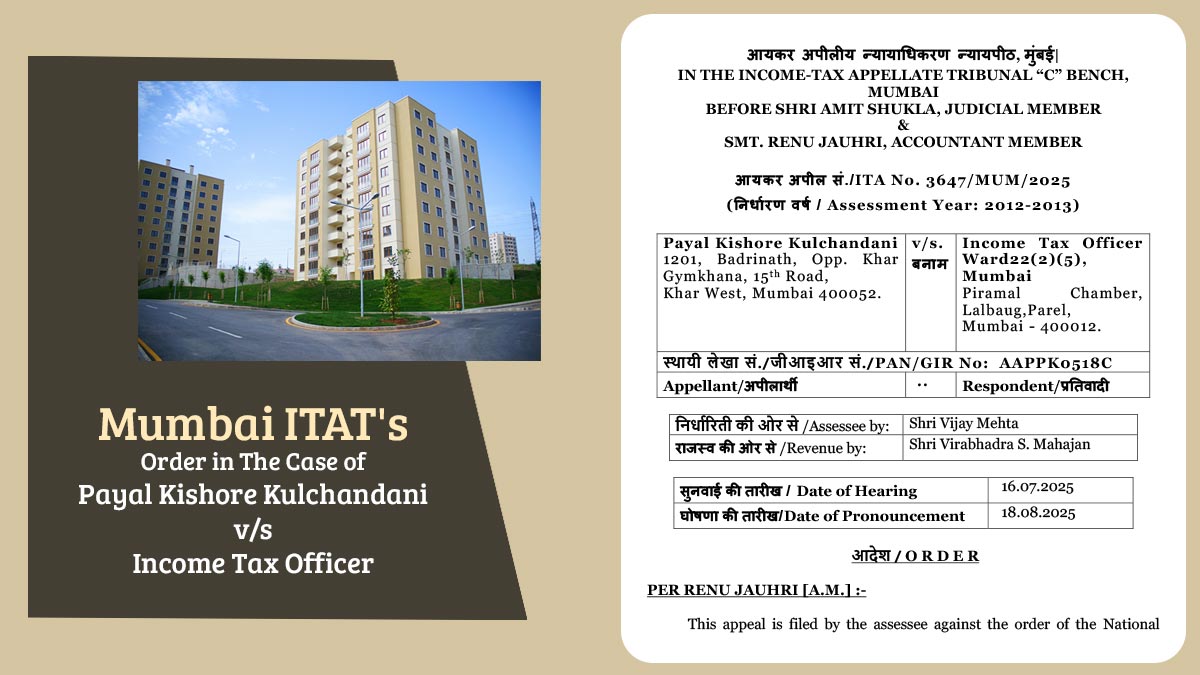
The Mumbai Bench of Income Tax Appellate Tribunal (ITAT) permitted the claim of Long Term Capital Gains (LTCG) exemption u/s 54 of the Income Tax Act,1961 on the sale of an old flat, as the possession of the new flat was received within the specified period.
The taxpayer, Payal Kishore Kulchandani, submitted her return reporting a total income of Rs. 4,03,770. LTCG of Rs. 91,33,892 has been reported by the taxpayer from the sale of an old flat on 21.07.2011, held jointly with her husband, and claimed exemption u/s 54 of the Act by purchasing a new flat jointly for Rs. 3,05,00,000.
The agreement to buy a new flat was on 28.08.2009, which was beyond the specified duration of 1 year before the sale of the old property. The AO, after marking that the majority of the payment had been made before 14.12.2009, disallowed the exemption and finished the assessment u/s 143(3) at a total income of Rs. 96,07,966.
Before the Commissioner of Income Tax (Appeals)[CIT(A)], the taxpayer appealed, who dismissed the appeal on 09.04.2025. After then submitted a plea before the tribunal.
The assessee’s counsel stated that the agreement to purchase the new flat was signed on August 28, 2009, with a partial payment made on December 14, 2009, followed by additional payments on February 7, 2011, and April 5, 2011. Possession was obtained on April 6, 2011.
He argued that the date of final payment and possession, rather than the agreement date, was relevant for claiming exemption under Section 54. Consequently, the assessee was entitled to an exemption on the sale of the old flat dated July 21, 2011.
He cited the High Court’s decision in CIT v. Smt. Beena K. Jain (217 ITR 363), which determined that the date of ownership of the new property is critical for claiming exemption under Section 54. He further cited the Supreme Court decision in Sanjeev Lal v. CIT [2014] 365 ITR 389, which stated that the Act should be interpreted purposefully to provide relief for long-term capital gains.
The counsel of the Department, as per the provisions of section 54, the purchase fell outside the specified period, and the CIT(A)’s confirmation of the disallowance must be kept.
The two-member bench, including Amit Shukal (Judicial Member) and Reenu Jauhri (Accountant Member), acknowledged the submissions of both parties and the judicial decisions quoted via the counsel of the taxpayer.
Read Also: Denial of LTCG Tax Exemption Not Allowed Due to Builder’s Error in Apartment Assignment
The case at hand is similar to CIT v. Smt. Beena K. Jain, in which the agreement for purchasing a new property was executed before the one year leading up to the sale of the old property.
However, possession of the new property was obtained within the required time frame. The High Court determined that for claiming exemption under Section 54, the relevant date is the date when full payment is made and possession is received.
On 06.04.2011, the taxpayer obtained possession of the new flat 1 year before the sale of the old flat, dated 21.07.2011. The taxpayer can claim the deduction u/s 54 and ask the assessing officer (AO) to permit the exemption on the LTCG, the tribunal ruled.
As per that, the appeal was permitted.
| Case Title | Payal Kishore Kulchandani vs. Income Tax Officer |
| Case No. | ITA No. 3647/MUM/2025 |
| Assessee by | Shri Vijay Mehta |
| Revenue by | Shri Virabhadra S. Mahajan |
| Mumbai ITAT | Read Order |








